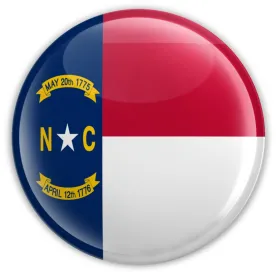SENATE BUDGET PROPOSAL
A $30 billion budget plan was approved by the state Senate on Thursday. It included tax cuts, a new $1.4 billion economic development program linked to the state's university system, $500 million for a triangle-area children’s hospital, an increase in the number of private school vouchers, and significant raises for state employees (smaller than those proposed by their counterparts in the North Carolina House).
The vote on Thursday was bipartisan, with 7 of the 20 Democrats in the chamber joining the Republican majority in voting in favor.
Both the House and Senate budget bills both call for spending $29.8 billion in the fiscal year beginning July 1 and $30.9 billion the following year, not including several billions for reserves, capital projects, and disaster relief.
Taxes
The Senate budget provides for larger tax reductions than the House proposal, bringing the personal income tax rate from its current level of 4.75% to 4.5% in 2019 and down to 3.99% in 2025. The Senate budget does not include any new corporate tax cuts, but it maintains cuts GOP lawmakers passed in 2021, bringing the corporate income tax rate to zero between now and 2030. The Senate proposal also introduces new excise taxes on ride-sharing services like Uber and Lyft, with the money going toward road upkeep.
Hospitals
According to the Senate proposal, any hospital in a county with more than 210,000 residents must assist the State Health Plan, which insures nearly 750,000 people, in making savings of $125 million by 2026. Failing to reach those savings marks creates a risk that those hospitals could lose their license, which would effectively force the hospital to close. This is likely a tactic to compel better contracts, and it is unlikely that hospitals will actually lose their licenses.
Beyond the simple "certificate of need" changes contained in the House budget, the Senate budget proposal would significantly lower the regulatory barriers that medical facilities must overcome before they can expand or use expensive equipment.
Budget Bill Impact on Contraception and Abortion
A provision in the Senate budget forbids the state from giving any funds for family planning to a group that performs abortions. Similar language is already included in state law, but it is updated periodically, according to Planned Parenthood, which is impacted by the language. Additionally, it would guarantee that Planned Parenthood would not be eligible for funding for contraceptives under the abortion legislation.
Differences between the Senate budget and the one the House passed in early April will now be resolved through negotiations between the House and Senate in conference committee. Once the budget is adopted by the conference committee and approved by both chambers, the budget bill will go to the Governor for signature. If he elects to veto the bill, that veto will likely be overridden, and the budget will become law.
ABORTION VETO OVERRIDDEN
North Carolina will no longer allow most abortions after 12 weeks of pregnancy, down from 20 weeks under the previous state law, after the Republican-controlled legislature overrode the Governor Roy Cooper's veto late on Tuesday in party-line votes—a significant victory for Republican legislative leaders who needed the support of every GOP legislator to pass the legislation.
The proposal also includes $160 million, which would increase funding for contraceptive services, lower infant and maternal mortality, and offer paid maternity leave to teachers and state employees.
Abortions performed before 12 weeks would still be legal, with certain provisos. The bill mandates that a doctor must be present when abortion medication is administered and necessitates in-person doctor visits for patients seeking medication abortions. It increases licensing requirements and regulatory fees for abortion providers, as well as new informed consent requirements.
Along with exceptions for "life-limiting" fetal anomalies during the first 24 weeks of pregnancy, the new abortion restrictions will also allow for rape or incest exceptions up to 20 weeks of pregnancy. There will still be an exemption for situations where the pregnant woman's life is in danger.
Governor Roy Cooper vetoed Senate Bill 20 after spending several days last week touring the state to win over at least one Republican. The four Republicans Cooper targeted, including one who recently defected from the Democratic Party, ultimately disagreed with him.
The new limits become effective on July 1.
Read more by North Carolina Public Radio
WIND TASK FORCE
The offshore wind industry could generate up to 85,000 jobs by 2035, according to Governor Roy Cooper's offshore wind task force, but some are calling for a moratorium due to concerns about the impact on North Carolina's coastal resources.
As part of a larger initiative by the Biden administration to develop 30 gigawatts of U.S.-based wind power by 2030, Cooper established the task force through an executive order in June 2021 to support his objective of producing 8 gigawatts of offshore wind power by 2040.
The urgency to move forward is brought on by growing opposition to offshore wind development in North Carolina and elsewhere. Environmentalists are concerned that preparations for wind projects could be a contributing factor in the recent increase in marine mammal deaths along the eastern seaboard.
Other opposition has centered on the potential harm that offshore wind farms could do to the state's tourism and recreation industries. Residents of Bald Head Island, Kitty Hawk, and other Outer Banks communities have expressed concerns about the aesthetics of proposed 800-foot-tall turbines that would be within sight, come with flashing lights, and have the potential to ruin local tourism.
Republican lawmakers from coastal areas have proposed legislation to put a ten-year hold on development efforts so that they can be better evaluated for potential drawbacks before moving forward.
Senate Bill 697 entitled “Save the State’s Coastal Resources” would create a “moratorium on the consideration of permit applications and issuance of permits for wind energy facilities to be located in the territorial coastal waters of the State due to the potential for adverse impacts to coastal resources of the State, including scenic and aesthetic resources, and recreational and economic uses, including commercial and recreational fishing.”
The legislation is sponsored by Senators Bobby Hanig (R-Currituck) and Norman Sanderson (R-Pamlico County) and is currently in the Senate Rules Committee.
Read more by The Center Square
REDEFINING RENEWABLE ENERGY
A proposed bill, Senate Bill 678, that would change the definition of "renewable energy" to "clean energy" under state law has drawn criticism from clean energy advocates and Governor Roy Cooper. If adopted by the North Carolina General Assembly, the measure would also put nuclear power on an equal footing with wind, solar, and hydroelectric power as North Carolina works to transition to a carbon-free energy grid by gradually retiring coal-fired power plants and replacing them with more environmentally friendly alternatives. The definition of a renewable energy source under current regulations excludes nuclear power.
Critics say renewable energy sources like wind and solar farms require large amounts of land to produce power equivalent to conventional sources like a natural gas-fired power plant or nuclear plant. Additionally, they claim that because of Mother Nature's whims which cause fluctuation in energy generation, they must rely on power storage facilities to balance production with demand.
The primary sponsor of the bill, former Duke Energy executive and state Senator Paul Newton, said the legislation also mandates that the state transition to a "green" economy in the most secure, dependable, and cost-effective manner possible. That entails upgrading to a cleaner electrical grid without drastically raising consumer utility bills.
According to proponents of clean energy, nuclear energy is not something North Carolina needs to expand. They argue that nuclear energy generates a lot of spent nuclear fuel that is difficult to dispose of and raises safety concerns in the wake of high-profile accidents at Three Mile Island in Pennsylvania, Chernobyl in Ukraine, and Fukushima in Japan.
PSYCHEDELIC THERAPY BILL ADVANCING WITH BIPARTISAN SUPPORT
Bipartisan support among state lawmakers is the result of a growing interest in the therapeutic uses of MDMA, also known as ecstasy, and psilocybin, also known as "magic mushrooms."
A House committee on Tuesday approved House Bill 727, the Breakthrough Therapies Research/Advisory Act, with little debate. The lawmakers who did speak expressed support for the legislation.
The Multidisciplinary Association for Psychedelic Studies, or MAPS, discovered that after receiving MDMA-assisted therapy, 88% of its first Phase 3 participants with severe PTSD experienced a clinically significant decline in their PTSD diagnostic scores.
According to the bill, MDMA research should concentrate on post-traumatic stress disorder treatment, particularly for veterans, first responders, frontline healthcare workers, domestic violence, and sexual assault survivors. In the meantime, psilocybin research should concentrate on treating "anxiety disorder, depressive disorder, or both." House Bill 727 would fund two grants totaling $5.4 million to study the therapeutic uses of psilocybin and MDMA.




 />i
/>i

